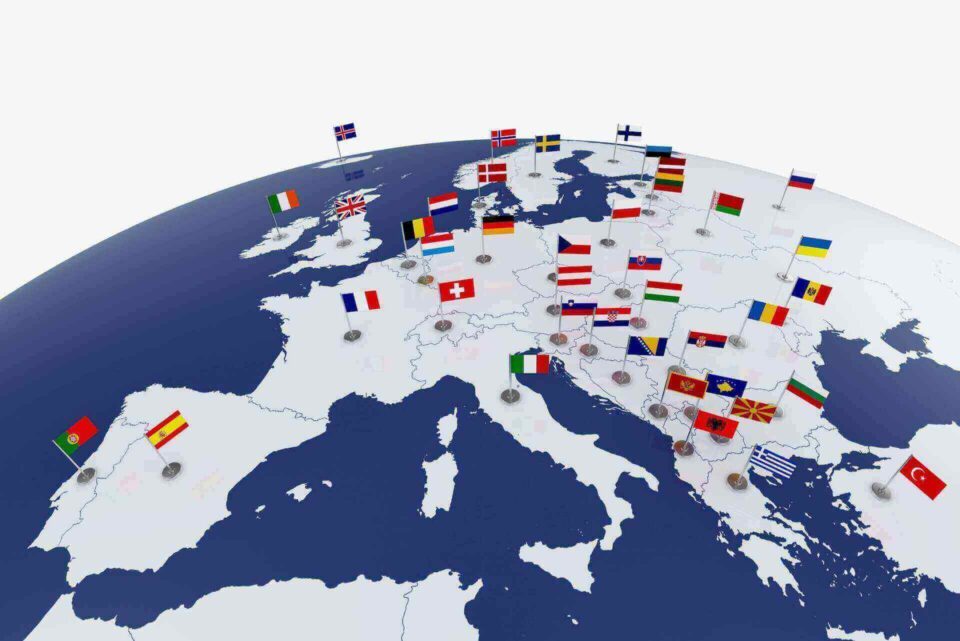Europe’s rich history, diverse cultures, and distinct lifestyle differences can make the experience of living in Europe as an American simultaneously thrilling and daunting. However, armed with the right knowledge and strategies, you can not only navigate but truly thrive in your European adventure. If you’re looking for ways to maximize your European living experience, our tips will help you do just that.

Familiarizing yourself with the local culture and language, finding affordable living and healthcare options, enjoying local cuisine, building relationships with locals, and seizing unique opportunities exclusive to Europe are all ways to thrive in your new home. Therefore, without further ado, let’s explore the best advice on how to embrace your new life as an American expat.
#1 Get Acquainted With the Culture and Language
Moving overseas offers an excellent opportunity to dive deep into European culture, with its rich historical heritage and diversity. Start by understanding the specific cultural norms, traditions, and social etiquette of the country you’ve chosen as your new home. Every European country has its unique customs, and it’s essential to respect these to integrate successfully into the local community.
Language, the heart of any culture, can significantly impact your daily life and overall experience. While many Europeans do speak English, learning the local language will open doors to more authentic interactions and experiences. Understanding the country’s history will also give you a deeper appreciation for your surroundings and make living in Europe a far richer experience. Books, documentaries, local museums, and guided tours can be excellent resources for this exploration.
Take Language and Culture Classes
Language and culture classes can significantly enhance your understanding and adaptability, making you feel more at home in your new environment. If you want to learn a language abroad, know that you’ll be able to do so through university classes, private tutoring, as well as online platforms. These classes often provide insights into cultural nuances, idioms, colloquialisms, and other tips for learning a new language, as well, which is invaluable for everyday interactions.
Taking part in cultural classes or workshops after shipping overseas can also deepen your understanding of local traditions, arts, cuisine, and more. These classes may be offered by community centers, cultural institutions, or even language schools. They can provide a hands-on way to understand and appreciate the culture beyond the surface level.
Reach Out to Local Organizations for Cultural Exchange Opportunities
Reaching out to local organizations can open up a wealth of opportunities for cultural exchange. These organizations often host events, workshops, and social gatherings that can help you meet locals and other expats.
Participation in cultural exchange programs can also offer immersive experiences. These programs, often organized by universities or cultural institutions, facilitate interactions between locals and foreigners, fostering a mutual exchange of cultures. This can range from sharing meals and holidays to participating in local festivals or traditions. Such experiences can not only enrich your understanding of the local culture but also help you make friends abroad and create meaningful connections and friendships.

#2 Take Advantage of Low-Cost Living Options
Living overseas in Europe can seem costly, especially in major cities, but there are ways to balance your finances abroad successfully. Start by thoroughly reviewing the accommodation options in different neighborhoods of your chosen city. Costs can vary significantly, with city centers typically being more expensive than outlying districts or smaller towns.
Prioritize your needs (proximity to work, public transportation, schools, safety, and local amenities) and find a neighborhood that offers the best balance. If you’re relocating on a low budget, consider house-sharing platforms or co-living spaces, especially if you’re single or relocating abroad alone. These options can significantly reduce your costs while offering a sense of community.
#3 Utilize Public Transportation to Your Benefit
Many European cities are known for their efficient and extensive public transportation networks. They offer a range of options, from buses and trams to subway systems, local trains, and in some cities, even ferries. Unless you plan on transporting your car through services such as overseas vehicle shipping, this can be a great solution for your daily commute.
Purchasing discounted passes can further reduce your travel expenses. Most European cities offer various types of passes based on duration (daily, weekly, monthly, or yearly) and user categories (students, seniors, and so on). For regular commuters, monthly or yearly passes are usually the most cost-effective. Some cities also offer tourist passes that combine transportation with free or discounted access to attractions.
Become Familiar With Schedules and Routes of Transportation Systems
Familiarizing yourself with the schedules and routes after getting packing services and relocating can significantly enhance your mobility and independence. Start by understanding the key bus, tram, or metro lines that connect your home to essential points like your workplace, shopping centers, or leisure spots. Also, note the frequency and operational hours of these services, as they can vary on weekends or public holidays.
Digital tools can be extremely helpful in navigating these systems. Use online maps, local transport apps, or multi-modal transport apps to plan your journey. These tools provide real-time updates, suggest the fastest or most convenient routes, indicate any service disruptions, and can even guide you step-by-step during your journey.
Packing Services
International relocation can be divided into several main stages and packing is one of them.
Read MoreOverseas Vehicle Shipping
When it comes to relocating your car, there is a way to do it that won’t cause a headache.
Read MoreStorage Service
Organizing an international move can be a nightmare if you don’t have a professional relocation company to help you with the overseas shipping of your entire household inventory.
Read More#4 Find Affordable Healthcare Solutions
Healthcare in Europe is known for its high standards, but it’s essential to ensure you have coverage that suits your needs and budget. As an expat, your options may include local, international, or private health insurance, depending on the country’s regulations and your visa status.
Before relocating across the world, you need to understand the healthcare system in your chosen country. Some countries offer public healthcare funded by taxes, while others require mandatory health insurance. Even within public healthcare systems, you may need additional private insurance for comprehensive coverage.
You also need to compare different insurance providers. Consider factors like:
- Premiums,
- Coverage limits,
- Deductibles,
- Out-of-pocket maximums,
- Included services,
- A network of doctors and hospitals.
International health insurance can be a good option if you travel frequently, plan to move countries, or if your local options do not provide adequate coverage. These plans typically offer a broad range of services and allow you to seek treatment in different countries.
Look Into Free Clinics or Low-Cost Health Care Centers
Free clinics typically offer basic medical services such as general check-ups, vaccinations, minor illness treatments, and sometimes even dental care or mental health services. They are often run by charities, non-profit organizations, or government entities. However, be aware that these clinics usually have specific eligibility requirements, and the range of services may be limited compared to regular healthcare facilities.
Low-cost healthcare centers operate on a similar model but charge a nominal fee for their services. The fees are typically based on a sliding scale, depending on your income. These centers often offer a broader range of services than free clinics, including specialist consultations, laboratory tests, and prescriptions.

#5 Explore Local Cuisine and Markets
Whether you’re relocating to Italy or, for example, planning to move to France, exploring local cuisine is one of the best ways to immerse yourself in the culture of your new European home. And what better way to begin than by visiting traditional farmers’ markets? While navigating these markets, don’t hesitate to chat with the vendors. They are usually passionate about their products and can provide tips on selecting, storing, and cooking their produce. This interaction is not only informative but also a great opportunity to practice your language skills and connect with the local community.
Check Out Popular Ethnic Restaurants in the Area
Europe, known for its cultural diversity, hosts an array of restaurants that cater to different tastes and budgets. Begin by trying the local cuisine in your new country. Whether it’s hearty German bratwurst, Spanish tapas, French escargot, Italian pizza, or Greek moussaka, each European cuisine is a reflection of its history, geography, and culture. Exploring local dishes not only satisfies your taste buds but also deepens your cultural understanding and appreciation.
Don’t stop at local cuisine – Europe’s multiculturalism extends to its food scene. You’ll find a variety of ethnic restaurants serving dishes from around the world. Checking out popular local eateries and food blogs, asking locals for recommendations, and using restaurant review apps can guide you in your culinary exploration.

#6 Connect With Locals for Support
Building connections with locals can be one of the most enriching aspects of living abroad. These relationships not only offer companionship but can also provide invaluable insights into the local culture, language, customs, and practical aspects of daily life, which will all help you deal with culture shock and adjust to a new country faster.
One way to connect with locals is through shared interests. Join local clubs, sports teams, hobby classes, or volunteering initiatives where you can meet people who share a common passion. This can be a natural and enjoyable way to build relationships. Professional networking can also lead to meaningful connections. If you’re working, engage with your colleagues, attend local industry events, or join professional networking platforms. If you’re studying, take part in campus activities, student clubs, and networking events.
For more advice on how to make new friends once you get international moving services from a company such as My International Movers and relocate overseas, check the video below:
#7 Living in Europe as an American Allows You to Experience Unique Opportunities
Europe is a home for some of the best countries to live in, and it offers an array of unique opportunities that are hard to come by in America. The compact nature of the continent allows for easy exploration, suitable for endless adventures and new experiences.
Take a Road Trip Across Various European Countries
Taking a road trip across Europe is a memorable experience. With open borders across much of the continent, you can easily transition from one country to another, each with its unique language, culture, and landscapes. Whether you’re exploring the romantic wine routes of France, the coastal beauty of the Amalfi coast in Italy, the historic castles of Germany, or the vibrant fields of tulips in the Netherlands, each turn brings new discoveries.
Immerse Yourself In Intriguing Historical Sites And Cities Around Continent
Europe is steeped in history, and you can immerse yourself in it by visiting its countless historical sites and cities. The ancient ruins of Rome, the preserved medieval towns of Eastern Europe, and the Renaissance chateaus of France each place has a story to tell. Many sites are UNESCO World Heritage Sites, well-preserved, and offer a window into the past.
Try Different Sports or Outdoor Adventures That Are Hard to Access Back Home
Europe offers sports and outdoor adventures that might be hard to find in America. From skiing in the Alps, hiking in the Scottish Highlands, sailing in the Mediterranean, or cycling once you move to Denmark, these options are abundant.
Now That You’re Ready to Move to Europe Contact an International Moving Company
Having prepared yourself to embrace the European lifestyle, the next practical step is to plan a move to a new city abroad. This is where a reliable overseas moving company, such as My International Movers, comes in. These professionals are experienced in handling cross-continental relocations, making your move smoother and more efficient.
Choosing the right international moving company is crucial. Relocating to a new country is a significant life event, and while it can be stressful, a trustworthy overseas shipping company helps alleviate the challenges. With your belongings safely on their way, you can focus on the exciting journey ahead. Therefore, once the time to move comes, make sure to have only the best by your side – contact us and book your move on time.
FAQ
What Are the Requirements to Live in Europe as an American?
Most likely, you’ll need a residence permit or a visa, depending on the duration and purpose of your stay. The specific requirements vary by country but generally include having a valid passport, proof of sufficient financial means, and in some cases, a job offer or acceptance to a university.
Are There Any Restrictions on How Long I Can Stay in Europe as an American?
As an American, you can stay in the Schengen Area (which includes most European countries) for up to 90 days within a 180-day period without a visa for tourism or business purposes. For longer stays (if you plan to get a job in Europe as an American or, for example, continue your studies), you will need to apply for a visa or permit in the country you wish to stay in.
Is It Difficult to Find a Job in Europe as an American Citizen?
Getting a job in a new city abroad can be challenging, but it’s not impossible. The difficulty often depends on your qualifications, language skills, and the demand in your professional field. Also, hiring non-EU workers involves extra paperwork and costs for European employers, which may deter some.
Do I Need a Visa to Travel and Live in Europe as an American Citizen?
Yes, if you plan to live, work, or study in Europe for more than 90 days, you’ll likely need a visa specific to the country you’re relocating to. The exact type of visa will depend on the purpose of your stay.
How Much Does It Cost to Live in Europe as an American Citizen?
The cost of living in Europe varies widely depending on the country and the city. Major cities like London, Paris, and Zurich are typically more expensive than smaller cities or rural areas. On average, it could range from $1,500 to $4,000 per month, depending on your lifestyle and location.
Are Healthcare Costs Covered When Living in Europe With US Insurance Plans?
European healthcare systems differ from the American system, and US insurance plans often do not provide coverage abroad. Therefore, when moving abroad, it’s essential to check with your insurance provider or consider purchasing international health insurance or private health insurance in the European country where you will live.
Are There Any Language Classes Available for Americans Living in European Countries?
Yes, language classes are available for Americans and other expats living in Europe, both in-person and online. If you need to break the language barrier, note that language schools are common, and many universities offer language courses as well.
Can I Bring My Pet With Me if I'm Moving From America to Another Country Within the EU?
You can relocate with your pet overseas, but there are requirements to meet. Your pet needs a microchip, a rabies vaccination, and in some cases, a tapeworm treatment. Additionally, you’ll need an EU pet passport or health certificate from a vet.
What Is the Process of Getting Local Residency or Citizenship While Living Abroad?
The process of gaining local residency or citizenship varies by country. In general, it involves living in the country for a certain number of years and demonstrating integration into society (like language proficiency).
Will My US Driver's License Be Valid While Driving Through Different European Countries?
An American driver’s license is valid for short-term stays in most European countries. For long-term residency, you will usually need to get a local driver’s license. Some countries have agreements that allow you to exchange your American license for a local one, while others require you to pass their driving tests.


















